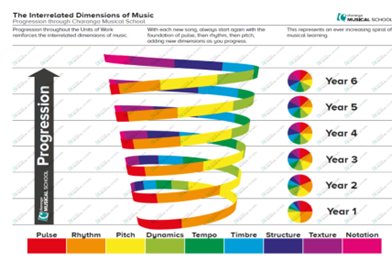Intent, implementation and impact
Intent:
Many studies across the world proves that listening and / or playing the music brings great benefits – stimulate the memory, elevate mood, helps to stay focused, reduce stress and blood pressure.
At Goresbrook School we believe that music has a superpower and plays an integral role in helping children to build their self-confidence, develop pupil’s language, creativity, social skills and make them part of a community. Therefore, we provide opportunities to all students in our school to create, play, perform and enjoy the music. Music lessons provided in our school give an opportunity for children to develop their skills, appreciate a wide variety of music and begin to appraise a range of musical genres.
Implementation:
At Goresbrook School music curriculum slowly built children's music skills and understanding of the subject*.
In EYFS children learn music by singing simple songs and rhymes which helps them develop their language – speaking and understanding. Also, our nursery and reception classes have their own set of tuned and untuned instruments where pupils experiment how to make sounds. Playing on the instrument in early age helps children to develop their listening and sensory motor skills.
In KS1 and KS2 qualified staff teach music using Charanga scheme. Music lessons are broken down into units where each unit develops many skills based on one song:
Listen and appraise – children analyse the song and learn more information about the composer and genre of the song
Musical activities – children become more confident in finding the pulse and the rhythm
Singing and voice – children learn the melody of the song and lyrics
Playing instruments – children learn to play the song on the instrument (glockenspiel or recorder)
Improvisation / Composition – children have an opportunity to write their own melody or make an improvisation of the song they have been learning in the unit
Perform and Share – this step summarise all knowledge and skills children achieved in the unit where children are performing together the song while playing on the instruments
* The Interrelated Dimensions of Music diagram illustrate how children's knowledge is being build thought all Key Stages.

Impact:
In EYFS we are focusing to make children familiar with the music subject. We teach them basic rhymes and songs, clap to the pulse and the rhythm and play on percussion instruments.
Key Stage 1 (Year 1 and Year 2) should be confident in understanding pulse, rhythm and pitch. They can explain basic music key vocabulary - dynamics, tempo, timbre and structure.
Key Stage 2 (Year 3 – Year 6) students are making connections between music elements, showing better understanding in composition and improvisation, becoming more confident on playing the instrument (glockenspiel / recorder), use and understand music vocabulary.
Graduated students (Y6) can:
· Enjoy and have an appreciation for all types of music
· Understand that music is beneficial in life and support people’s wellbeing
· Listen to, review and evaluate music across a range of historical periods, genres, cultures, styles and traditions.
· Sing and use their voices to create different effects
· Create and compose music
· Use and understand music key vocabulary
· Have a judgements and express opinion about the quality and style of music